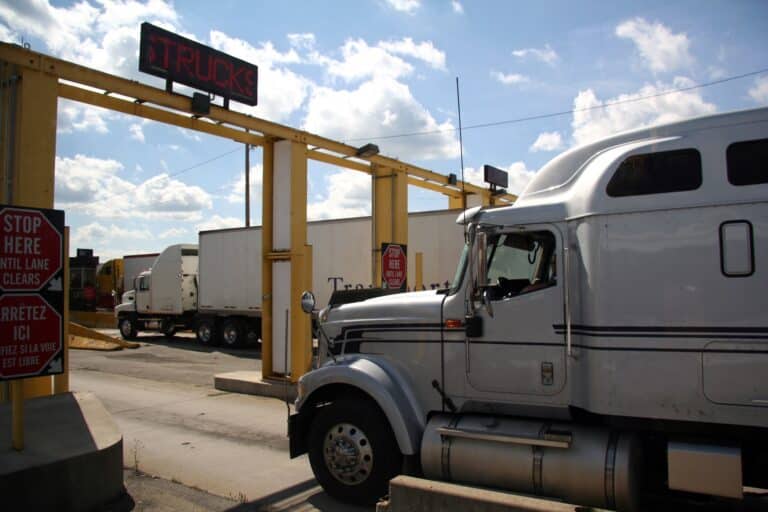In today’s highly competitive trucking industry, fleet managers face numerous challenges in ensuring the efficiency, safety, and profitability of their operations. One of the most effective tools for addressing these challenges is GPS fleet tracking technology. By providing real-time visibility into vehicle locations, driver behavior, and overall fleet performance, GPS tracking systems enable fleet managers to make data-driven decisions that optimize their operations and improve their bottom line.
However, with countless fleet tracking providers in the market, each offering a unique set of features and benefits, selecting the right company can be a daunting task. The purpose of this article is to provide truckers and fleet managers with a comprehensive guide on choosing a fleet tracking company that meets their specific needs and requirements. We will explore the benefits of working with a reputable provider, highlight the top GPS fleet tracking companies in the industry, and discuss the key factors to consider and red flags to avoid during the selection process.
Do you have any questions? Talk to ELD Advisor: 650-405-3372 or Request Callback
The Benefits of Working with a Reputable Fleet Tracking Company
Partnering with a dependable fleet tracking company can yield numerous benefits for truckers and fleet managers alike. Some of the most significant advantages include:
- Improved fleet efficiency and productivity. GPS fleet tracking systems provide real-time data on vehicle locations, routes, and idle times, enabling fleet managers to identify opportunities for optimization and improvement. By leveraging this data to streamline routes, reduce fuel consumption, and minimize vehicle downtime, fleets can significantly enhance their overall efficiency and productivity.
- Enhanced vehicle and driver safety. Truck tracking companies often offer features such as real-time alerts for speeding, harsh braking, and other risky driving behaviors. By monitoring and addressing these issues proactively, fleet managers can promote safer driving practices and reduce the likelihood of accidents, injuries, and costly liabilities.
- Reduced operational costs. By optimizing routes, reducing fuel consumption, and improving vehicle maintenance schedules, fleet tracking systems can help trucking companies significantly reduce their operational costs. Additionally, some providers offer idling monitoring, enabling fleet managers to monitor and control fuel expenses more effectively.
- Ensuring compliance with industry regulations. Many fleet tracking solutions include electronic logging device (ELD) capabilities, which help truckers and fleet managers ensure compliance with the Federal Motor Carrier Safety Administration’s (FMCSA) ELD mandate. By automating hours-of-service (HOS) tracking and reporting, these systems reduce the risk of violations and associated penalties.
- Access to reliable customer support and training. Top fleet tracking companies prioritize customer success by offering comprehensive support and training resources. This includes responsive technical assistance, user-friendly tutorials, and ongoing guidance to help truckers and fleet managers maximize the value of their fleet tracking investment.
Top Fleet Tracking Companies
When it comes to selecting a fleet tracking provider, truckers and fleet managers have a wide range of options to choose from. To help narrow down the field, we’ve compiled a list of some of the top fleet tracking companies in the industry, along with their key strengths and potential drawbacks.
HOS247

- Top-rated customer support available in multiple languages, including Spanish, Russian, and Polish.
- One-year hardware warranty with free replacements for defects and malfunctions.
- Real-time GPS tracking and reporting tools for fuel usage, idle times, and maintenance needs.
- Flexible, scalable subscription plans without long-term contracts, and two-week trial.
- Provides ELD compliance and customizable solutions for various fleet sizes.
Verizon Connect
- Comprehensive fleet management solution with advanced features.
- Robust reporting and analytics capabilities.
- Integrates with a wide range of third-party software and hardware.
- Excellent customer support and training resources.
- Higher pricing compared to some competitors.
GPS Insight
- Customizable reporting and alert features.
- Offers a range of hardware options, including asset trackers and dash cams.
- Provides ELD compliance and fuel management features.
- Competitive pricing and flexible contract terms.
- Limited integration options with third-party software.
US Fleet Tracking
- Real-time tracking with 5-second updates.
- No long-term contracts required.
- Offers a range of hardware options, including hardwired and battery-powered devices.
- Provides ELD compliance and fuel management features.
- Some users report issues with customer support responsiveness.
- Higher upfront costs for hardware compared to some competitors.
Azuga
- Offers a comprehensive fleet management solution with gamification features to promote safe driving.
- Provides ELD compliance and fuel management features.
- Competitive pricing and flexible contract terms.
- Extensive training resources.
- Limited customization options compared to some competitors.
It’s essential to keep in mind that while these are some of the top GPS fleet tracking companies in the industry, the best provider for your business will depend on your specific needs, budget, and priorities. Be sure to thoroughly research and compare multiple providers before making a final decision, taking into account factors such as pricing, contract terms, feature sets, and customer support offerings.
Red Flags to Watch Out for When Selecting a Fleet Tracking Provider
While there are many GPS fleet tracking companies in the market, there are also some providers that may not live up to their promises or meet your business’s needs. To help you avoid potential pitfalls, here are some red flags to watch out for when selecting a fleet tracking provider:
- Lack of transparency in pricing and contract terms. Be cautious of providers that are not upfront about their pricing or that offer deals that seem too good to be true. Some companies may hide additional fees or require long-term contracts with steep early termination penalties. Make sure to carefully review all pricing and contract terms before signing on with a provider, and don’t hesitate to ask questions or seek clarification if anything is unclear.
- Limited or outdated technology and features. Fleet tracking technology is constantly evolving, and it’s crucial to choose a provider that stays up-to-date with the latest advancements and features. Be wary of companies that rely on outdated or limited technology, as this can hinder your ability to optimize your fleet’s performance and stay competitive in the industry. Look for providers that offer a comprehensive suite of features, including real-time tracking, real-time alerts, and robust reporting capabilities.
- Poor customer reviews and ratings. One of the best ways to gauge the quality and reliability of a fleet tracking provider is to read reviews and ratings from current and former customers. If a company has a high volume of negative reviews or low ratings, this may be a sign that they struggle with system reliability, customer support, or other key areas. Be sure to read reviews from multiple sources and pay attention to any common themes or complaints that may indicate underlying issues with the provider.
- Inadequate customer support and training resources. A reliable fleet tracking provider should offer comprehensive customer support and training resources to ensure that you can maximize the value of their solution. Be cautious of companies that provide limited or unresponsive support, as this can leave you struggling to resolve technical issues or answer critical questions about the system. Look for providers with a proven track record of customer success, including responsive support channels, user-friendly training materials, and ongoing guidance.
- Lack of industry-specific expertise and experience. Not all fleet tracking providers have the same level of expertise or experience in the trucking industry. Some companies may offer generic solutions that don’t account for the unique challenges and requirements of truckers and fleet managers. To ensure that you’re getting a solution that truly meets your needs, look for providers with a deep understanding of the trucking industry and a track record of success in serving fleets like yours.
By keeping an eye out for these red flags and prioritizing providers that demonstrate transparency, reliability, and industry expertise, you can avoid potential pitfalls and find a fleet tracking company that truly supports your business’s success.
HOS247 Fleet Tracking System

In the competitive world of trucking, efficiency and reliability are paramount. HOS247 is a leading provider of fleet tracking solutions tailored specifically to the needs of truckers and fleet managers. With a comprehensive suite of features and exceptional customer care policies, HOS247 stands out in the industry. Let’s explore the benefits of HOS247’s fleet tracking system:
- Real-time GPS tracking. HOS247 provides real-time GPS tracking, allowing fleet managers to monitor vehicle locations instantly. This feature enhances route planning and dispatch efficiency, helping reduce fuel consumption and improve delivery times.
- High-quality hardware. HOS247 offers robust and reliable hardware. We believe in the quality of our product, so we offer free replacements during the first year in the off chance you encounter a defect.
- Efficient customer support. We pride ourselves on providing top-rated customer support. Their team is available in multiple languages, including Spanish and Russian, ensuring clear communication and effective problem-solving for a diverse range of users every day of the week. The call-back policy further enhances customer satisfaction, allowing you to request assistance at your convenience.
- No contracts, flexible subscription plans. One of the standout features of HOS247 is our no-contract policy. Fleet managers can choose from flexible subscription plans based on their specific needs without being locked into long-term commitments. This flexibility allows businesses to scale their tracking solutions as they grow.
- Two-week trial. To ensure that their system meets your needs, we offer a two-week trial period. During this time, you can test their tracking system without any risk. If it doesn’t fit your requirements, you can return it hassle-free.
- Top-rated ELD. HOS247’s FMCSA-approved electronic logbook is top rated by truckers on app distribution platforms. This compliance feature helps trucking companies meet legal requirements and enhances overall operational efficiency.
HOS247’s fleet tracking system offers a comprehensive suite of benefits designed to enhance efficiency, safety, and compliance for truckers and fleet managers. By choosing HOS247, you’re not just investing in a GPS tracking system; you’re partnering with a company committed to your success on the road.
Evaluating and Comparing Fleet Tracking Providers
Once you have a shortlist of potential fleet tracking providers, it’s essential to take a systematic approach to evaluate and compare them based on your specific needs and requirements. Here are some key steps to follow during the evaluation process:
- Conducting thorough research on potential providers. Start by gathering as much information as possible about each provider on your shortlist. Visit their websites, read through their feature lists and pricing pages, and look for any case studies or testimonials that demonstrate their success in serving fleets like yours. Don’t hesitate to reach out to providers directly with any questions or concerns you may have, as this can help you gauge their responsiveness and expertise.
- Requesting demos and trials to test the system’s functionality. Many fleet tracking providers offer demos or trials of their solutions, which can be a good opportunity to test the system’s functionality and ease of use firsthand. Take advantage of these offerings to explore the platform’s features, interface, and reporting capabilities, and to see how well it integrates with your existing systems and workflows. Be sure to involve key stakeholders from your team in the demo process, including drivers, dispatchers, and maintenance staff, to get a well-rounded perspective on the system’s strengths and limitations.
- Gathering feedback from industry peers and reading customer reviews. In addition to conducting your own research and testing, it can be helpful to gather feedback from other truckers and fleet managers who have experience with the providers you’re considering. Reach out to industry peers, join online forums or social media groups, and attend industry events to network and exchange insights. As mentioned earlier, reading customer reviews from multiple sources can also provide valuable information about a provider’s reliability, customer support, and overall performance.
- Preparing a checklist of your fleet’s specific needs and requirements. To ensure that you’re evaluating providers based on the criteria that matter most to your business, take the time to prepare a detailed checklist of your fleet’s specific needs and requirements. This may include factors such as fleet size, vehicle types, routing needs, compliance requirements, and budget constraints. Use this checklist as a framework for comparing providers side-by-side, and don’t be afraid to prioritize the features and capabilities that are most critical to your operations.
- Comparing features, pricing, and support offerings side-by-side. Finally, create a comprehensive comparison matrix that lists each provider’s key features, pricing, contract terms, and support offerings side-by-side. This will allow you to easily identify the strengths and weaknesses of each option and make an informed decision based on your specific needs and priorities. Be sure to consider both the upfront and long-term costs of each solution, as well as any potential hidden fees or limitations that could impact your return on investment.
By following these steps and taking a thorough, systematic approach to evaluating and comparing fleet tracking providers, you can find the right partner to help you optimize your operations, enhance your safety and compliance, and ultimately drive your business’s success.

Conclusion
Partnering with a reputable fleet tracking company is essential for optimizing your operations, ensuring compliance, and driving long-term success. GPS tracking systems empower truckers and fleet managers to make data-driven decisions that enhance efficiency, safety, and profitability.
As you search for the ideal fleet tracking company, take the time to conduct thorough research, gather feedback from industry peers, and test potential solutions through demos and trials. By investing the necessary time and effort into the evaluation process, you can avoid common pitfalls and find a provider that truly aligns with your business’s values and objectives. Ultimately, the right fleet tracking company can be a powerful ally in your quest for operational excellence and long-term success.

As an expert in B2B and B2C sales, I’ve dedicated myself to perfecting sales processes and client retention strategies in the logistics and trucking industry. I have significantly contributed to the expansion of the ELD service, catering to retail and wholesale clients in need of HOS247 ELD solutions. My unwavering commitment to implementing state-of-the-art sales techniques and technologies ensures the continuous growth and success of businesses I work with.












As a truck driver, your electronic logging device (ELD) isn’t just another piece of equipment — it is your daily companion. A reliable electronic logbook can simplify compliance with regulations, reduce stress on the road, and even improve profitability, while

In the world of trucking, reliability and efficiency are essential for success. As drivers navigate complex regulations and manage their hours of service (HOS) logs, they require efficient electronic logging devices (ELDs) to achieve compliance with Department of Transportation (DOT)

In today’s dynamic business environment, where efficient operations and cost savings are crucial, fleet tracking has become a vital solution for trucking businesses. This technology uses GPS and advanced fleet management systems to monitor and manage vehicles in real time,